Machine Head's Robb Flynn: “When we were first starting out, I used to say, ‘I want us to be the Grateful Dead of metal’”
Flynn discusses the making of Machine Head's epic new album, Of Kingdom and Crown, the magic of the Roland Cube, and why Wacław “Vogg” Kiełtyka is the perfect foil on guitar
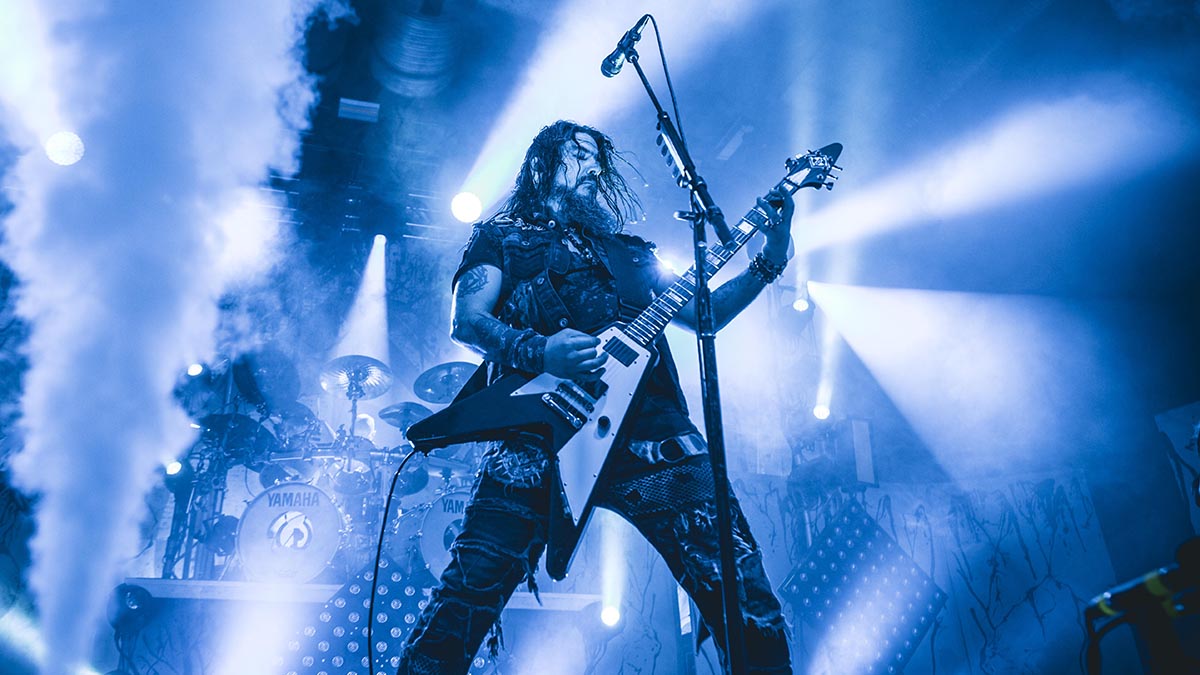
It’s a good thing Machine Head founder Robb Flynn has the gift of the gab. When Guitar World catches the Bay Area metal veteran over Zoom, he’s sitting in his home studio, seven hours deep into a hefty day of promo surrounding his band’s 10th full-length, Of Kingdom and Crown.
As it stands, he’s supremely amped to get into the details of the album – which further expands Machine Head’s propensity for ground-fracking grooves, harmonic-accented madness and darkly melodic hooks – but he also admits up front that he’s more than ready to shift the focus off himself, at least for a bit.
You see, on top of playing with Machine Head, Flynn hosts a podcast called No F’n Regrets, with which he gets into long-form, career-arcing, occasionally gut-busting conversations with friends like Meshuggah’s Mårten Hagström and Biohazard’s Billy Graziadei. In this particular case, he’s readying himself to speak with Oceano vocalist Adam Warren once our time is up.
Since founding Machine Head in 1991, Flynn has commanded crowds with a rich and oak-y baritone speaking voice, which nevertheless rises toward an aggressively vein-popping, in-song bellow.
It was Hatebreed vocalist and podcaster Jamey Jasta who egged him on to start No F’n Regrets, suggesting Flynn’s low-end register would be ASMR-style ear candy for listeners. More than 130 episodes later, though, Flynn’s realized that self-restraint leads to increasingly stellar episodes.
“If you let people talk, they’ll tell you more than you ever wanted to know,” he suggests. “One of the things I learned early on is that there’s a natural tendency to want to talk about [yourself], like, ‘This is what I’m doing!’ But if you can push that down and continually go, ‘No, what are you doing? Tell me about that,’ you can get some great shit.”
In a sense, Of Kingdom and Crown is another way for Flynn to let someone else do the talking. The album is sung and screamed from the perspectives of two characters living within a dystopian wasteland “where the sky is always crimson red."
Get The Pick Newsletter
All the latest guitar news, interviews, lessons, reviews, deals and more, direct to your inbox!
The first, Ares, loses the love of his life and goes on a vengeful killing spree; the second, Eros, becomes radicalized following the overdose death of his mother, and likewise goes on a murderous rampage.
Though its themes of fascism, racism and violence have cropped up in politically potent Machine Head releases in the past, there’s also a morally ambiguous bent to Of Kingdom and Crown, where its traumatized protagonists feel they’re the good guys, but also commit “acts of pure atrocity and evil.”
“I’m a guy who’s written nine albums through how I view society,” Flynn notes. “Just like most artists, they write about things that have happened to them. Now I’m writing through these characters.
“It’s set in this fantasy place where I can get as violent or brutal as I want – or as sad as I want. The story can be about a million things. Once I started getting into it creatively, it tripped me out. It totally opened up the way that the record went, too, as a result.”
Just like the motives of Of Kingdom and Crown’s focal figures, Machine Head’s latest release isn’t a cut-and-dry affair. There are high-velocity thrash attacks (Choke on the Ashes of Your Hate); anthemic, Black Album-leaning stomp-a-thons (Unhallowed); and discordantly djent-infused ballads (Arrows in Words from the Sky).
You could even argue that, at least contextually, the chilling sound design of Overdose – made up of the sound of a failing heart monitor and consoling words from a doctor – makes for the heaviest track on the entire album.
As for Machine Head, their lineup has also taken some wild swings these past few years. Since unleashing Catharsis in 2018, longtime lead guitarist Phil Demmel split to concentrate on his reformed Vio-Lence (in which Flynn had also played guitar, pre-Machine Head).
By 2019, former drummer Chris Kontos and lead guitarist Logan Mader rejoined the fold for a round of Burn My Eyes 25th anniversary dates, though that was a temporary reunion. Flynn and bassist Jared MacEachern are now joined by a new co-guitarist, Decapitated’s Wacław “Vogg” Kiełtyka, and drummer Matt Alston.
Recording through the pandemic led to remote work, but Flynn and MacEachern also grew closer via the band’s run of Happy Hour livestreams from Flynn’s personal studio.
What began as a pressure-reliever during the pandemic has turned into an integral part of the Machine Head experience – a place to re-envision Machine Head tunes, or put fun-as-hell spins on songs by Bob Marley, Fleetwood Mac and System of a Down. The vibe is something Flynn is excited to bring on tour, meshing some of Machine Head’s heaviest tunes yet with a loose, living-for-the-moment, jam-band attitude. Another of Of Kingdom and Crown’s many juxtapositions.
Coming off of Catharsis – a record you’d said incorporated more pop elements than prior Machine Head releases – do you feel that experiment brought you deeper toward melody on Of Kingdom and Crown, or does this stand as an extra-pissed-off reaction to that record?
“I mean, it’s a ferocious record, hands down, [but] we just write, you know? I’m not trying to be heavy, or trying to be pop-y. I feel like [one thing] that played the biggest influence on this record [was] getting together with Chris and Logan for the Burn My Eyes 25th anniversary tour.
I knew that our music was going to be really busy, fast, thrashy and technical, so I wanted to have these very simple vocal lines. I just wanted to be brutal
“Getting to reconnect and jam again was awesome on so many levels, and [the tour] was wildly successful – sold out, everywhere. Granted, all those songs had been in rotation at some point, but to play it all in one [set] took me back to where I was at the time – not that I really feel like I could write from that same headspace, of a 24-year-old dude running around the streets, out of his mind and fighting, drinking and fucking every weekend.
“I think that would be really phony to write from that, because that was 28 years ago – I’m a father with two teenage boys, now – but it made me remember my mindset when I was writing that record, and the things I wanted to accomplish. I knew that our music was going to be really busy, fast, thrashy and technical, so I wanted to have these very simple vocal lines. Simple cadences, not even a lot of notes; I just wanted to be brutal. That’s one of the big things I brought back to this [album].
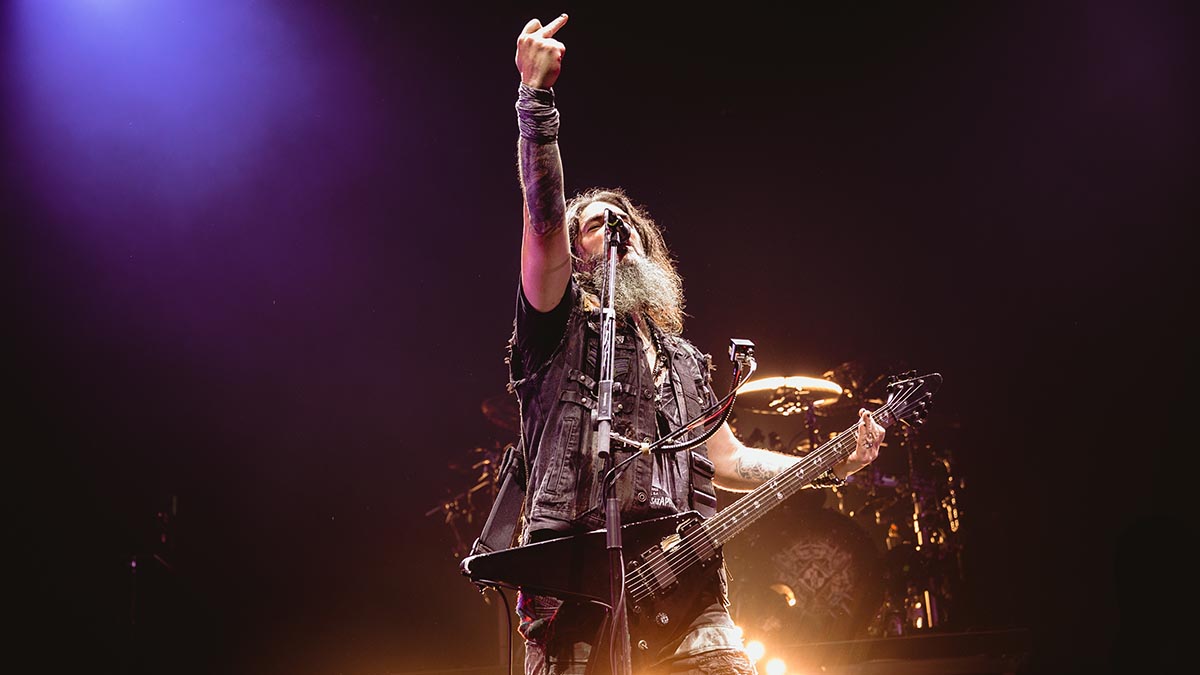
“I think the other thing is that when the pandemic hit, we had been touring for five fucking months and then our US tour ended when I got Covid. Two weeks later, the world shut down. I was like, ‘I gotta play,’ so I started coming down to my studio here and doing acoustic Happy Hours.
“I was the only one allowed [in here], because everything was locked down, so I [went], ‘I’m coming down on Friday. I’m going to drink beer, play acoustic songs, and if you want to come hang, I’m going to be here for two hours.’
“I started doing it on Facebook Live through my phone, with a little microphone. It was totally spontaneous. I would just jam any song I wanted to – re-envisioned Machine Head songs; I took requests for cover songs. Sometimes it was amazing; sometimes it was a total trainwreck, but it was fun. And people started tuning in.”
Had you considered bringing Logan and Chris back into the band full time and writing new Machine Head material with most of the Burn My Eyes lineup in place?
“We definitely tried. Logan and I actually did write [together] for the first time in 27 years for this album. But, you know, everybody was hustling [with different projects and schedules]. It ended up not happening, so Jared and I really buckled down here and focused on Of Kingdom and Crown.”
We come from the same place in metal. Definitely a thrash influence. When we construct leads, it’s always borrowing from Gary Holt or Kirk Hammett
What can you say about starting a new chapter with Vogg [Wacław Kiełtyka], then, and creating a new guitar tandem? Was there anything in particular about his style that you felt would work perfectly within Machine Head?
“He’s a phenomenal guitar player, just insane. I had met him a decade back when Decapitated came though San Francisco on the Summer Slaughter tour, and we hit it off. Then he would come out to our shows when we would roll through Poland. I wouldn’t say we were friends, but we had an email relationship.
“I think we come from the same place in metal. Definitely a thrash influence. When we construct leads, it’s always borrowing from Gary Holt or Kirk Hammett, something from that realm. The very first guitar solo I ever learned all the way through was Gary Holt’s on [Exodus’] Bonded by Blood. That was a big deal.
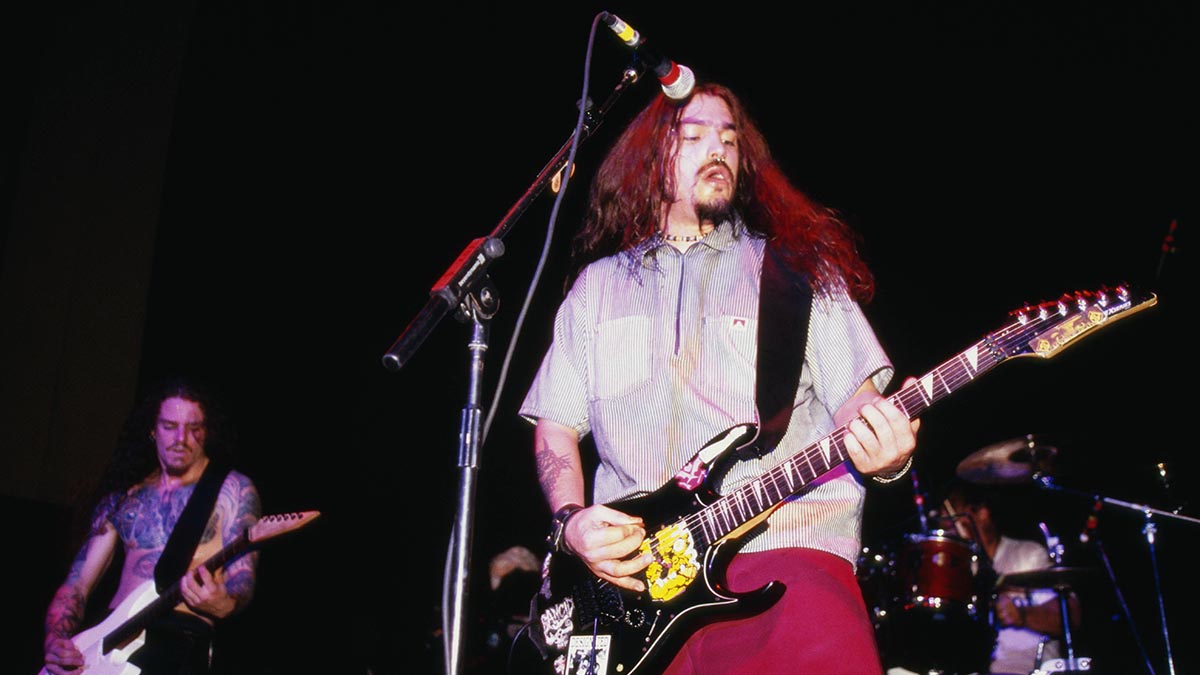
“[Kiełtyka] suggested it: ‘Hey, would you ever consider having a guy like me in Machine Head?’ I was like, ‘Dude, let’s try it!’ We were doing auditions, and he sent in a video of himself playing Imperium [off 2003’s Through the Ashes of Empires], and he could play it better than I could at that point – holy fuck, the dude just shredded it. We’d talk on the phone or over FaceTime, and I felt a kindred spirit. And I knew he was a road-dog; he wasn’t green.
“We got together about two weeks before a European tour started. We were just at a hotel. We both had those little Roland Cubes, which I think are the best thing ever; those little battery-powered amps sound killer. We ran through a couple of songs… and I just remember thinking, ‘I feel like I’ve jammed with this dude for 10 years.’
“We were so fucking locked in; it was so tight. No click tracks; no drums; we’re just jamming freestyle. It was a wild connection, man. Awesome to have him, and great contributions to the record. He wrote the main verse riff in Unhallowed.”
Can you touch on how natural harmonics remain a huge factor in the Machine Head sound? Popping off harmonics seems to have always been a part of your style.
“Absolutely. It’s our trademark. Whenever you hear a band doing harmonics, they took that from Machine Head. [Laughs] It’s kind of funny how the whole harmonic thing came together for me. When I first started playing guitar, I was crazy about Celtic Frost’s Morbid Tales and D.R.I.’s Dealing with It!, the punk-rock crossover classic.
“My parents didn’t have a lot of money. I was bugging my dad about getting a guitar, and he was like, ‘I don’t think you’re going to stick with it. We’re going to rent a guitar, you’re going to try it, and if after three months I don’t see any improvement, we’re not going to do that again.’ We went and rented a guitar for $50, the cheapest guitar the store in Fremont would loan us.
“I’m sitting there just trying to learn every D.R.I., Slayer, Metallica or Celtic Frost song. Especially with Celtic Frost and D.R.I., they had all this feedback, but I didn’t know what feedback was. I was like, ‘What’s that sound?’ I’ve got no distortion box, I’m playing out of an amp as big as my phone, so I just mistakenly hit a harmonic and was like, ‘Oh… that must be what that is.’
“I got good at doing really quick little harmonic hits, because I think I’m playing feedback. Later on, of course, some friend of mine was like, ‘No, you idiot, that comes from the amp.’ But it became part of my style. It sounds cool to me.”
Can we get into some of the intensity on this album? I’m thinking pieces like Become the Firestorm, which starts off with this particularly ruthless trill section, overtop those blast beats…
“I woke up with that melody in my head one day and was like, that would be sick on guitar. I just came down here with Zack [Ohren], my engineer, and I was like, ‘Dude, hit the fastest click track you got and I’m going to track this riff.’ Once it was together – the little hesitations and stops here and there – I got such a killer vibe off it. It was just this burst of creativity. I was lucky enough to have Zack here to track it with me, and then it was done.”
My main guitar is a custom that this luthier Dragan made. The thing’s beat to shit. It’s got this giant groove dug into the wood from down-picking
Can we get into gear? Are you still primarily playing baritone guitars?
“All I have are baritones.”
What’s the backbone of your rig on this record?
“Well, my main guitar is a custom that this luthier Dragan made – he did all the custom shop work for Gibson Europe. It’s still my main stage guitar. I’ve had it forever; the thing’s beat to shit. It’s got this giant groove dug into the wood from down-picking.
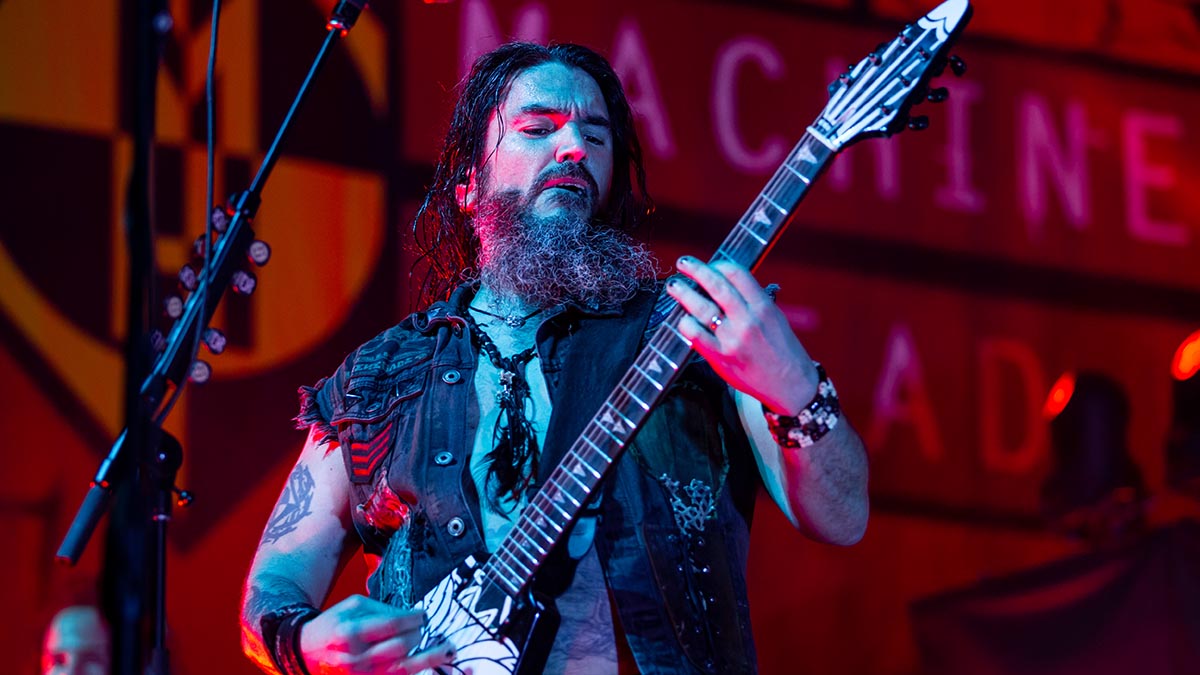
“It’s flawless because it’s so fucked up, you know what I mean? I love this guitar; it sounds and plays great. That was far and away my main guitar, and then I had another guitar for my barre stuff, another Flying V he made that has a Floyd Rose.
“Rig-wise, we tracked DI. We re-amped all the leads through a Bradshaw unit [Custom Audio Electronics], and for the guitar tones we re-amped with a Kemper and a Quad Cortex – that thing is savage. Our main clean tone was through a plug-in by the guy who made the Satan amp [Ola Englund].”
How about effects?
“I’ve got the Electro-Harmonix Small Stone; the [Warm Audio] Jet Phaser; the Electro-Harmonix Electric Mistress – the big fucker that if you leave it on, and you turn your volume off, you can hear the ‘conk’ sound every three seconds because there’s something’s spinning in there. I love that flanger. And I’ve still got my Jimi Hendrix fuzz pedal. I’m big on those old '70s analog effects.
“[Sometimes] I would track through my rig, and we would just fly that in for those really heavily effected parts, because it sounded like it needed the breakup of the amp to sound fucked up. That’s what’s killer to me: when it’s oversaturated and overly distorted. There’s a lot of that.”
Did the Roland Cube make it onto the record?
“No, it didn’t unfortunately. It’ll be on the road, though. We fuckin’ love that thing. That’s what we jam through before every show.”
Years ago, you did this roundtable interview for Guitar World with Kerry King and Billy from Biohazard. It’s kind of a funny piece, hinging around the idea of “metal is dead, what do you think about that?”
“I remember.”
Somewhat on that idea, where do you feel metal culture is all these years later, and how does Machine Head fit into it? For instance – and this is taking it out of context within the storyline – but there’s this line of dialog on the album between Rotten and Arrows in Words from the Sky: “You’ve created the world in which you live.” How does that line speak to a life lived with Machine Head?
You’re not competing against other bands, you’re competing against yourself; you’re competing against your guitar-playing skills from a year ago, or 10 years ago
“That’s a deep, philosophical question, but I feel like we’ve had a hell of a career arc, you know? We just celebrated 30 years, and we’ve had some of our biggest albums and songs in the last five to 10 years of our career, which makes no sense! I like what you’re saying there about ‘you make your own world,’ or whatever. For me, I’ve been lucky enough to have great players, no matter what. We haven’t had a lot of lineup changes, but the chain that we’ve had has been all great players.
“I remember hearing a quote from Michael Jordan years ago: ‘You don’t have to love the NBA; you just have to love the game of basketball.’ That’s how you’ll flourish. I got it at the time, but I really get it now. Like, you don’t have to love the music business; you just have to love the music. You’re not competing against other bands, you’re competing against yourself; you’re competing against your guitar-playing skills from a year ago, or 10 years ago.
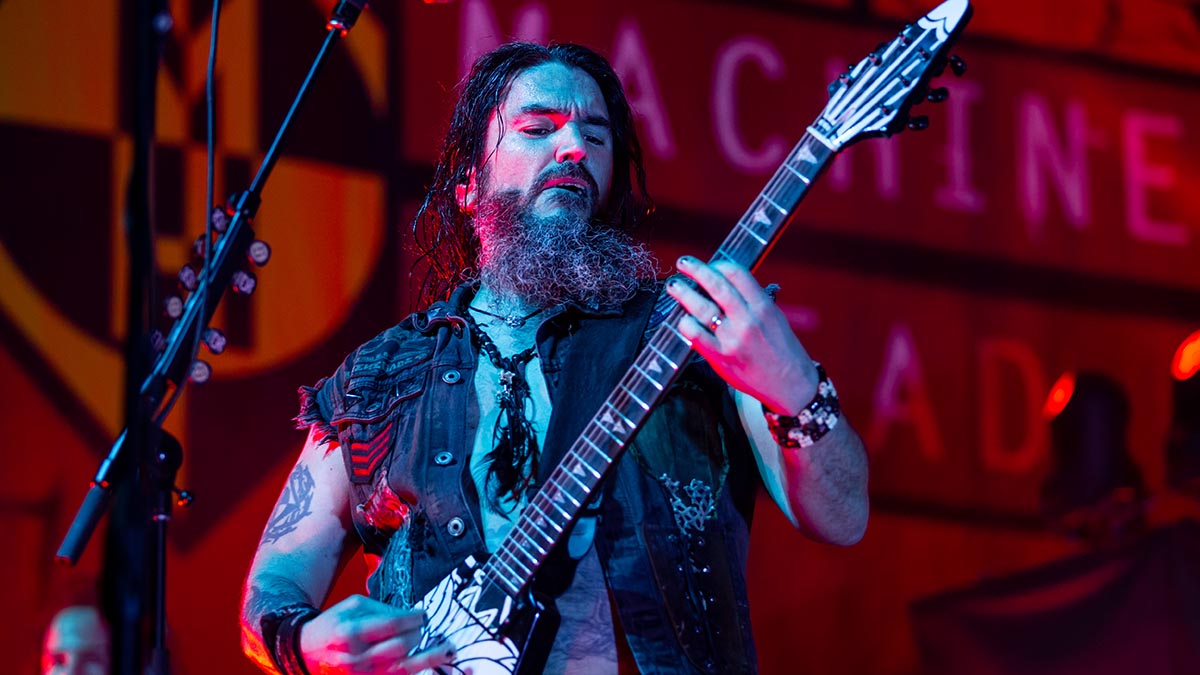
“You’re constantly trying to better yourself as a player, a lyricist or a vocalist. It’s very easy to get caught up in the bullshit of the music industry – the drugs, the free booze… other famous people trying to ride your jock – [but] you’ve got to tune that shit out. It sounds very hippy-dippy, but I remember when we were first starting out, I used to say, ‘I want us to be the Grateful Dead of metal.’
“I wanted us to have a fan base and a culture that revolves around this band that is so outside of the regular bullshit. Grateful Dead didn’t need radio; they didn’t need MTV. They could fuckin’ pack out everywhere and have this crazy, loyal fanbase. And we’ve done that! We built this fanbase around what we did.
I really feel like once we get back out there and start touring again, it’s going to be a lot like a Happy Hour. It’s going to be these very spontaneous, loose sets
“A lot of people don’t seem to be aware of this, but we’ve done over 120 Electric Happy Hour shows, which is the weekly Friday livestream. It’s for the hardcore fans. We’ve done full album playthroughs; we try to learn two to three new [cover] songs every week.
“We don’t make a setlist; it’s totally spontaneous. We’ll play deep cuts. I mean, Jared and I know every Machine Head song ever written at this point. I really feel like once we get back out there and start touring again, it’s going to be a lot like a Happy Hour. It’s going to be these very spontaneous, loose sets. It’ll have the hits from the Machine Head canon – for lack of a better word – [but] it’s [also] going to be cover songs and deep cuts; mixing it up a lot. I love that.”
- Of Kingdom and Crown is out now via Nuclear Blast.
Gregory Adams is a Vancouver-based arts reporter. From metal legends to emerging pop icons to the best of the basement circuit, he’s interviewed musicians across countless genres for nearly two decades, most recently with Guitar World, Bass Player, Revolver, and more – as well as through his independent newsletter, Gut Feeling. This all still blows his mind. He’s a guitar player, generally bouncing hardcore riffs off his ’52 Tele reissue and a dinged-up SG.
“We hadn’t really rehearsed. As we were walking to the stage, he said, ‘Hang on, boys!’ And he went in the corner and vomited”: Assembled on 24 hours' notice, this John Lennon-led, motley crew supergroup marked the beginning of the end of the Beatles
“I pushed myself to down-pick faster and make the riffs more aggressive. Maybe it’s the old man in me struggling to feel young and fighting back against aging”: How Killswitch Engage went to thrash metal bootcamp to deliver their face-ripping return



![[from left] George Harrison with his Gretsch Country Gentleman, Norman Harris of Norman's Rare Guitars holds a gold-top Les Paul, John Fogerty with his legendary 1969 Rickenbacker](https://cdn.mos.cms.futurecdn.net/TuH3nuhn9etqjdn5sy4ntW.jpg)







